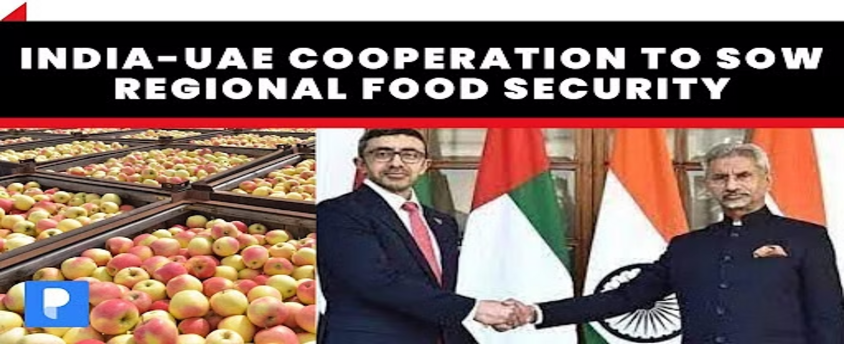India-UAE food security partnership
21, Apr 2023

Prelims level : International Relations
Mains level : GS-II International Relations | Bilateral, Regional and Global Groupings and agreements involving India
Why in News?
- Despite the efforts to increase domestic food production, the UAE still heavily relies on global markets for its food security.
- The country imports about 90% of its food requirements, including staple foods such as rice, wheat, and meat.
- The UAE’s reliance on global markets for its food security is driven by a number of factors, including the limited availability of arable land, water scarcity, and a harsh climate.
- The UAE is now prioritising the attainment of both food accessibility and preparedness for potential supply chain disruptions.
- As the world’s second-largest food producer, India is a crucial collaborator for the UAE in its efforts to enhance food security.
India’s capabilities:
- India is the world’s second-largest producer of food, with a diverse range of crops grown across the country. India’s vast agricultural potential and growing export capabilities have positioned it as a global agri-export powerhouse.
- India’s top agricultural exports include rice, wheat, spices, fruits, and vegetables. The country has also been able to establish itself as a leading exporter of organic products, such as tea, coffee, and spices.
- India’s growing agricultural exports have also been supported by the government’s initiatives to promote trade and investment in the sector.
- For example, the government has set up dedicated export zones and provided incentives for agricultural exports.
- India has demonstrated a strong commitment towards enhancing its agri-capabilities in the global food marketplace through significant budgetary investments in setting up large food parks and modernising supply chain management.
- These efforts have been further bolstered by India’s focus on leveraging bilateral trade agreements to maximise its potential in the food sector.
- In recent years, India has also acted as a humanitarian provider of food to developing countries, demonstrating awareness of its evolving role in advancing regional and global food security.
- Concurrently, India runs the Public Distribution System, the world’s largest food subsidy programme, which offers subsidised grains to almost 800 million citizens.
- India’s focus on promoting the consumption and farming of millets as a part of its G-20 presidency reflects its commitment to the global food security dialogue with an emphasis on building resilience.
- During its G-20 presidency, India is focusing on three major issues, referred to as the “three Cs”, which are Covid, Conflict, and Climate, that pose a significant threat to food security in India and around the world.
- India can use its position to establish sustainable, inclusive, efficient, and resilient trade pathways with the UAE to shape the future of food and drive global development.
UAE’s contribution to India-UAE food security partnership:
- At the I2U2 (India, Israel, the United Arab Emirates, and the United States) summit held in July 2022, the UAE pledged a $2 billion investment to build food parks in India.
- The India-UAE food corridor scheme signed during the Comprehensive Economic Partnership Agreement (CEPA) negotiations with logistics partner DP World is a strategic initiative aimed at promoting food security and increasing bilateral trade between India and the UAE.
- The scheme involves the establishment of a dedicated logistics network to facilitate the movement of food products from India to the UAE and other parts of the world.
- The India-UAE food corridor scheme is expected to enhance the competitiveness of Indian agriculture and food products in the international market, create new employment opportunities, and generate significant foreign exchange earnings for India.
- It is expected to benefit as many as two million farmers across various Indian states and generate as many as 200,000 additional jobs over the next three years.
- An Indian-owned business conglomerate in Abu Dhabi, the Lulu Group, is planning to invest $8 million in setting up cold storage and sorting facilities in the Union Territory of Jammu & Kashmir to facilitate the export of fruits and vegetables grown in the state.
- The group already imports the world-famous Kashmiri apples and saffron from the UT into the UAE.
- Apart from maintaining and diversifying its food reserves, the UAE stands to gain numerous benefits from the food corridor scheme.
- By leveraging its strategic location between Asia and Europe, the UAE could potentially serve as India’s food export gateway to West Asia and Africa, and even beyond, thereby strengthening trade linkages between the two nations.






